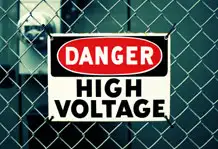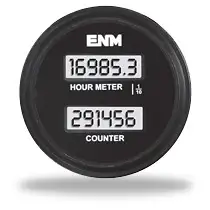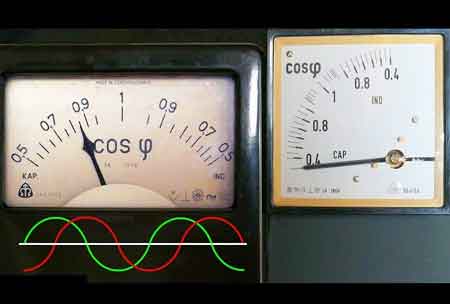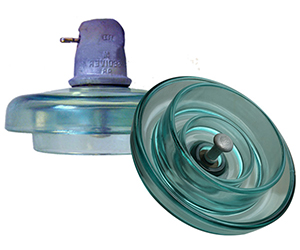NFPA 70B 2023: Electrical Maintenance Standard
By R.W. Hurst, Editor
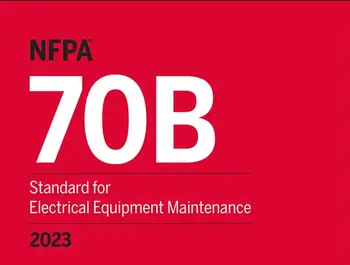
NFPA 70b Training - Electrical Maintenance
Our customized live online or in‑person group training can be delivered to your staff at your location.

- Live Online
- 12 hours Instructor-led
- Group Training Available
Download Our OSHA 4475 Fact Sheet – Being Aware of Arc Flash Hazards

- Identify root causes of arc flash incidents and contributing conditions
- Apply prevention strategies including LOTO, PPE, and testing protocols
- Understand OSHA requirements for training and equipment maintenance
NFPA 70B 2023 sets the standard for electrical equipment maintenance, reliability, and predictive testing. It helps facilities improve safety, reduce downtime, and extend asset life through condition-based maintenance programs.
What is NFPA 70B 2023?
NFPA 70B 2023 is the Standard for Electrical Equipment Maintenance, providing practical guidelines for maintaining safe, reliable, and cost-effective electrical systems.
✅ Defines condition-based and preventive maintenance practices
✅ Improves electrical safety and asset reliability in facilities
✅ Reduces downtime, failures, and long-term operating costs
NFPA 70B 2023 is the essential standard for electrical equipment maintenance, providing comprehensive guidelines to ensure the safety, reliability, and efficiency of electrical systems. Electrical workers must follow the guidance in NFPA 70B to prevent equipment failures, reduce downtime, and minimize the risk of electrical hazards. By adhering to this standard, workers can implement effective maintenance practices that extend the life of electrical equipment, protect workers from potential dangers, and ensure compliance with industry regulations. Following the standard is crucial for maintaining safe, reliable electrical operations in industrial, commercial, and institutional settings. Predictive testing, as outlined in NFPA 70B, often relies on specialized tools, such as insulation resistance testers, to detect early signs of equipment failure.
The Importance of NFPA 70B 2023
Electrical equipment forms the backbone of modern facilities, powering everything from essential machinery to lighting systems. However, improper maintenance of this equipment can lead to safety hazards, equipment failures, and costly downtime. The standard provides a comprehensive framework for developing electrical maintenance plans that mitigate these risks.
The standard mandates the establishment of comprehensive maintenance programs for electrical equipment to ensure safety, reliability, and efficiency. The primary goal is to prevent equipment failures and extend the lifespan of electrical systems through systematic maintenance practices. The standard emphasizes the importance of preventive maintenance, which involves regular inspections, testing, and servicing of electrical components to identify and address potential issues before they lead to failures. Condition-based maintenance programs recommended by NFPA 70B can benefit from advanced data loggers that record system performance trends.
Sign Up for Electricity Forum’s Test Equipment Newsletter
Stay informed with our FREE Test Equipment Newsletter — get the latest news, breakthrough technologies, and expert insights, delivered straight to your inbox.
Key Elements of NFPA 70B 2023 Edition
-
Developing an Electrical Maintenance Plan: The standard emphasizes the creation of a documented electrical maintenance plan. This plan should identify all equipment requiring maintenance, list the recommended maintenance tasks, and establish maintenance frequencies. The standard utilizes a risk-based approach, encouraging maintenance programs tailored to the specific equipment and its operating environment. Factors such as equipment age, operating conditions, and the equipment manufacturer's recommendations should be taken into account when determining maintenance needs and frequencies.
-
Condition-Based Maintenance: The 2023 edition places a strong emphasis on condition-based maintenance. This approach utilizes various testing and monitoring techniques to assess equipment conditions rather than relying solely on predetermined maintenance schedules. By focusing on identified needs, condition-based maintenance optimizes maintenance resources and minimizes unnecessary downtime of equipment. The standard also supports effective electrical troubleshooting practices to minimize downtime and improve system reliability.
-
Personnel Qualifications: The standard recognizes the importance of qualified personnel performing maintenance on electrical equipment. The standard does not prescribe specific qualifications but emphasizes the need for personnel to possess the knowledge and skills necessary to safely and effectively maintain electrical systems.
What are the Key Updates to the 2023 Version?
The latest version introduces several key updates compared to the 2019 edition, significantly enhancing its approach to maintaining electrical equipment. One of the major differences is the shift from a recommended practice to a mandatory standard, making compliance with the standard essential for ensuring safety and operational integrity. The 2023 edition emphasizes a risk-based maintenance strategy, enabling organizations to tailor their maintenance programs to the specific risks associated with their equipment and operations. Additionally, the updated version incorporates more detailed guidance on predictive maintenance techniques, such as thermography, partial discharge testing, and vibration analysis, to better detect potential issues before they result in failure. The 2023 update also aligns more closely with other key electrical safety standards, such as NFPA 70E, to create a comprehensive safety framework for electrical systems. Following NFPA 70B guidelines, facilities can implement industrial electrical maintenance strategies that extend equipment life and reduce risk.
The Standard for Electrical Equipment Maintenance provides guidelines for developing and implementing a maintenance program for electrical systems. Its purpose is to improve the safety and reliability of electrical equipment through systematic and proactive maintenance practices. This standard outlines the necessary steps to ensure that electrical systems function efficiently and safely, reducing the risk of electrical failures and accidents.
Difference Between NFPA 70E 2024 and NFPA 70B 2023
NFPA 70E 2024 and NFPA 70B serve different but complementary purposes in the realm of electrical safety and maintenance:
-
NFPA 70E (Standard for Electrical Safety in the Workplace): Focuses on protecting workers from electrical hazards during the operation and maintenance of electrical systems. It provides guidelines for safe work practices, including the use of personal protective equipment (PPE), arc flash hazard analysis, and safe work procedures to minimize the risk of electrical injuries.
-
NFPA 70B (Standard for Electrical Equipment Maintenance): Concentrates on the maintenance practices necessary to keep electrical equipment in safe and reliable operating condition. It emphasizes preventive maintenance to avoid equipment failures and ensure long-term reliability.
The key difference lies in their focus: NFPA 70E 2024 is concerned with safety during electrical work, whereas the standard addresses the ongoing maintenance of electrical equipment to ensure its safe operation. Preventive programs under NFPA 70B align with preventive maintenance training, helping workers apply best practices in the field.
Difference Between NFPA 70B 2023 Edition and NETA MTS
While NFPA 70B provides general guidelines for maintaining electrical equipment, NETA MTS-2023 (Standard for Maintenance Testing Specifications for Electrical Power Equipment and Systems) offers detailed procedures for testing and verifying the performance of electrical systems:
-
NFPA 70B provides a comprehensive framework for developing a maintenance program, emphasizing preventive maintenance practices and the overall condition of electrical equipment.
-
NETA MTS: Offers specific maintenance testing specifications, detailing the tests and inspections required to verify the operational integrity of electrical power systems. It includes precise methodologies for testing various components, such as transformers, circuit breakers, and protective relays.
The primary difference is that 70B outlines the necessary steps to maintain electrical equipment, whereas NETA MTS-2023 specifies the procedures for testing and validating the performance of these systems. Technicians applying NFPA 70B practices often rely on essential tools, such as digital multimeters and analog multimeters, for accurate electrical measurements.
Electricity Today T&D Magazine Subscribe for FREE

- Timely insights from industry experts
- Practical solutions T&D engineers
- Free access to every issue
How NFPA 70B and NETA MTS Work Together
NFPA 70B encourages the use of industry best practices for developing electrical maintenance plans. NETA MTS-2023 serves as a valuable resource to facilitate this process. Facility managers and maintenance personnel can leverage the standard to establish a foundational electrical maintenance plan, identifying equipment that requires maintenance and establishing maintenance frequencies. They can then refer to NETA MTS-2023 to find specific testing procedures and maintenance tasks tailored to their specific equipment.
Benefits of a Combined Approach:
-
Comprehensive Electrical Maintenance Plans: By combining 70B and NETA MTS-2023, facilities can develop comprehensive electrical maintenance plans that address both the framework and the specific needs of their equipment.
-
Enhanced Safety and Reliability: Following these best practices helps to ensure the safety and reliability of electrical systems. Through proper maintenance, the risk of electrical incidents is minimized, and the lifespan of equipment is maximized.
-
Reduced Downtime: Condition-based maintenance, promoted by both 70B and NETA MTS, helps to identify and address equipment issues before they lead to unexpected failures and downtime.
Importance of an Electrical Maintenance Plan
An effective electrical maintenance plan, guided by standards such as 70B and NETA MTS, is crucial for ensuring the reliability and safety of electrical systems. Equipment manufacturers often recommend specific maintenance practices for their products, which should be integrated into the overall maintenance strategy.
Preventive maintenance is a cornerstone of these standards, helping to identify and address potential issues before they lead to equipment failures. Regular inspections, testing, and servicing of electrical components are critical aspects of maintaining system reliability and safety.
Understanding and implementing the guidelines provided by 70B and NETA MTS-2023 is crucial for maintaining a safe and reliable electrical system. The standard focuses on preventive maintenance to ensure the long-term reliability and safety of electrical equipment. In contrast, NETA MTS-2023 provides detailed testing procedures to verify the performance of electrical systems. By adhering to these standards, organizations can develop a robust electrical maintenance plan that minimizes risks and enhances the efficiency and safety of their electrical systems.
This comprehensive approach to maintenance not only ensures compliance with regulations but also enhances the overall safety culture within the organization, ultimately protecting both workers and assets from electrical hazards.
Related Articles






